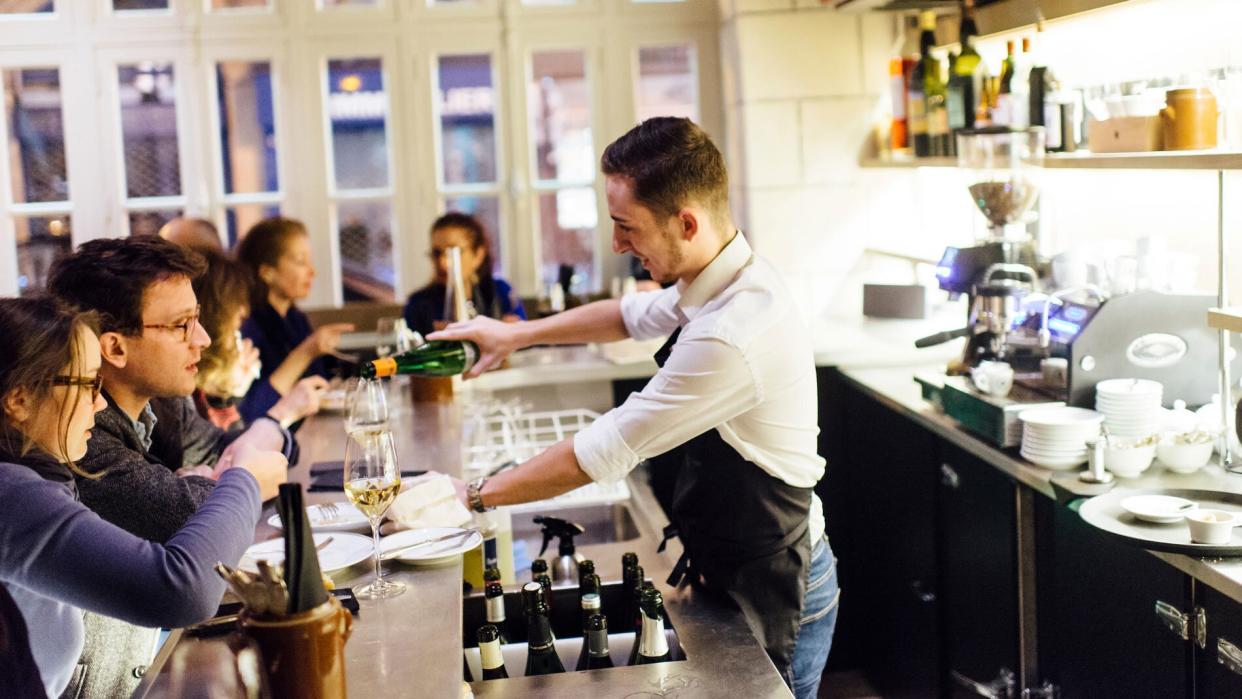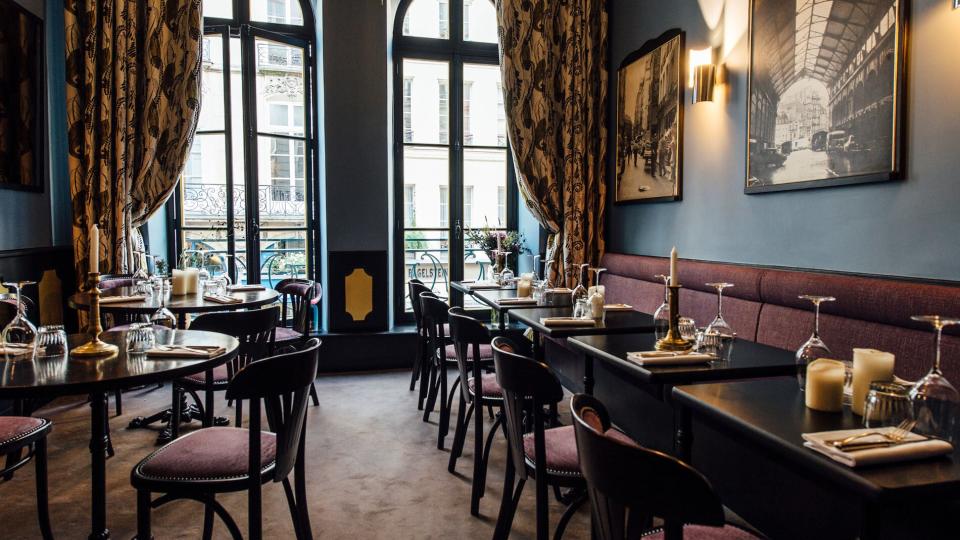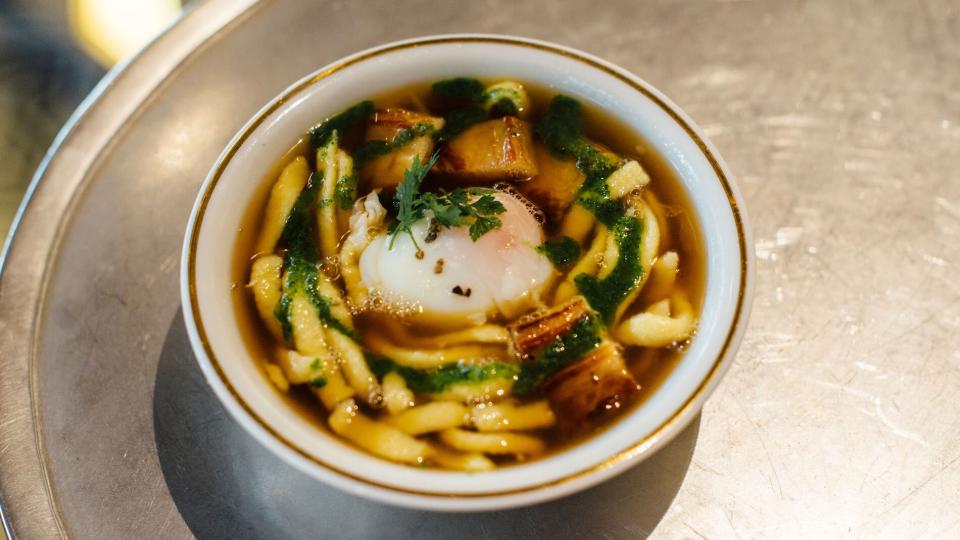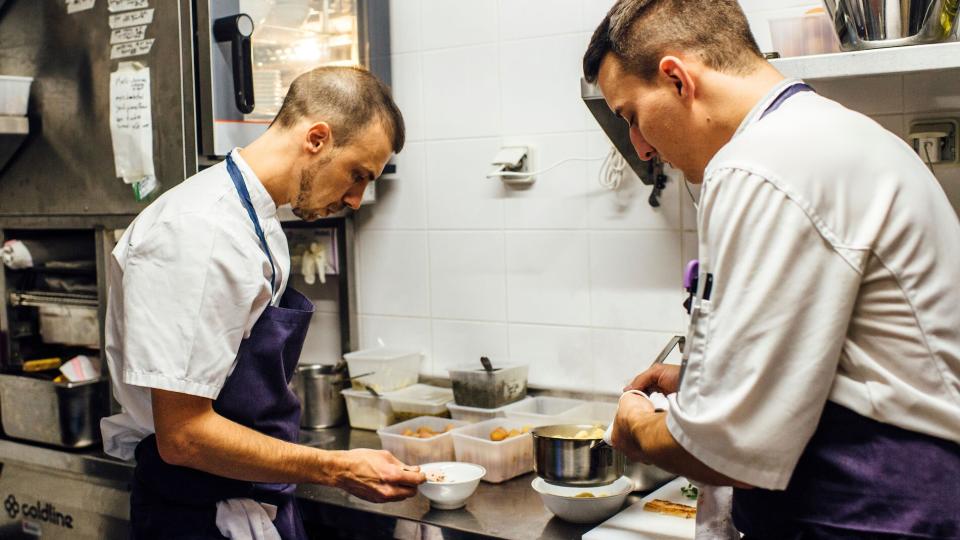How Daniel Rose Revitalized a Cramped, Celeb-Packed Paris Café

Jean-Marie Heidinger
You wonder if Adrienne would like the walls.
At Chez La Vieille in the center of Paris, the white walls—off-white by wear rather than design—are now a steely blue and the long wood table crammed with chairs replaced by a handful of dark two-tops. That lingering musty smell is gone, too, but the old lady's prints of Parisian streets still hang.
Adrienne Biasin was the notoriously grumpy proprietress and cook who earned her name "la vieille" (old lady) when she was still in her twenties. After opening Chez La Vieille almost 60 years ago in a small apartment building with a spindly staircase, she cooked for the French elite—Michelin-starred chefs, celebrities—who yearned for her rustic, on-the-fly, no-frills food. Garlic soup with thin, slippery noodles. Mustardy rabbit stew. She was very particular about who came into her restaurant. Nabbing one of the ten tables was a serious feat.

Jean-Marie Heidinger
But not for Daniel Rose, the chef who just won a James Beard Award for his instant-hit Le Coucou in New York City. Eight years ago and well after Biasin ran the show out of that closet-size kitchen, Chez La Vieille was just the canteen conveniently located across the street of his then-budding project, Spring. Construction bumped along for two years, which more time at Chez La Vieille for Rose.
"I should thank the city of Paris for letting me discover it in such an intimate way," says Rose. "It's one of the last luxuries. If you look at Chez La Vieille, you think, 'I can only be in Paris.'"
That balance of fussiness and laissez-faire is struck in these old-school bistros—that kind of cooking where butter is the backbone, diets be damned—and that romantic feeling that rushes in once you sit down to your first meal in France. These relics of the iconic French restaurant seems to fascinate Rose—when I asked him for recommendations in Paris, he sent timeless spots, nothing new—and trickle down into his restaurants.
Spring eventually emerged as the face of bistronomie, the new-wave bistro movement that took root in France in the early 2000s, and Le Coucou wowed from the start with attention to tiny service details (snuffing the candle before it melts down to four inches) and a revival of French fine-dining with modern touches (chicken and foie crepinettes with pineapple) in the States. And while Le Coucou captured the American food writers even as the opening was delayed again and again last year, no one really paid to what he was doing at little old Chez La Vieille.

Jean-Marie Heidinger
"The last person to own Chez La Vieille tried to sell it to me back in 2010, but ended up selling it to another guy," says Rose. "He installed a bunch of chefs over the years—a Japanese guy with Michelin stars, one who wanted Spanish tapas—but nothing lasted long. It was way off track of the real spirit of the place. Then it just closed for two and half years. I couldn't stand to have it just sit there, so I bought it from him."
Rose never met Biasin—she died in the 2000s—but he knew a lot about her personality from the regulars who remained faithful over the years and her cooking from a book she published in the 80s, the height of her career.
"If you look at the recipe for her duck terrine, it says, 'duck, pork fat, salt, pepper, nutmeg.' There is no real exact amount. It really leave a lot up to the cook," says Rose.
And that's just what he and his crew from Spring did as they reimagined and reopened Chez La Vieille in the fall of 2016, poring over her cookbook but not necessary following word for word because that's not how Biasin operated. This past spring when I visited, that translated into a light soup with fat, chewy noodles, roasted poussin drenched in a vibrant vinegary sauce and, yes, "Adrienne's duck terrine."

Jean-Marie Heidinger
"There's something remarkable in a deliciousness that's timelesss, and that's part of the genius of French cooking," says Rose. "We want to make sure that we live up to the reputation of Adrienne."
Though "grumpy" is a word that's tossed around a lot when you talk or read about Biasin, Rose has another theory about the legendary woman.
"I assumed she was very generous and sweet. You give up a little part of you in your cooking," he says. "She could have just crammed people into the restaurant. But I think her tenderness was probably in her cooking, and she was very selective about who she let in."
The ghost of Biasin happily haunts the new-old bistro these days, and you think: Maybe she would have liked the walls.